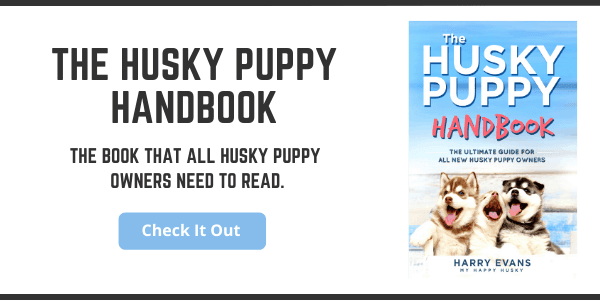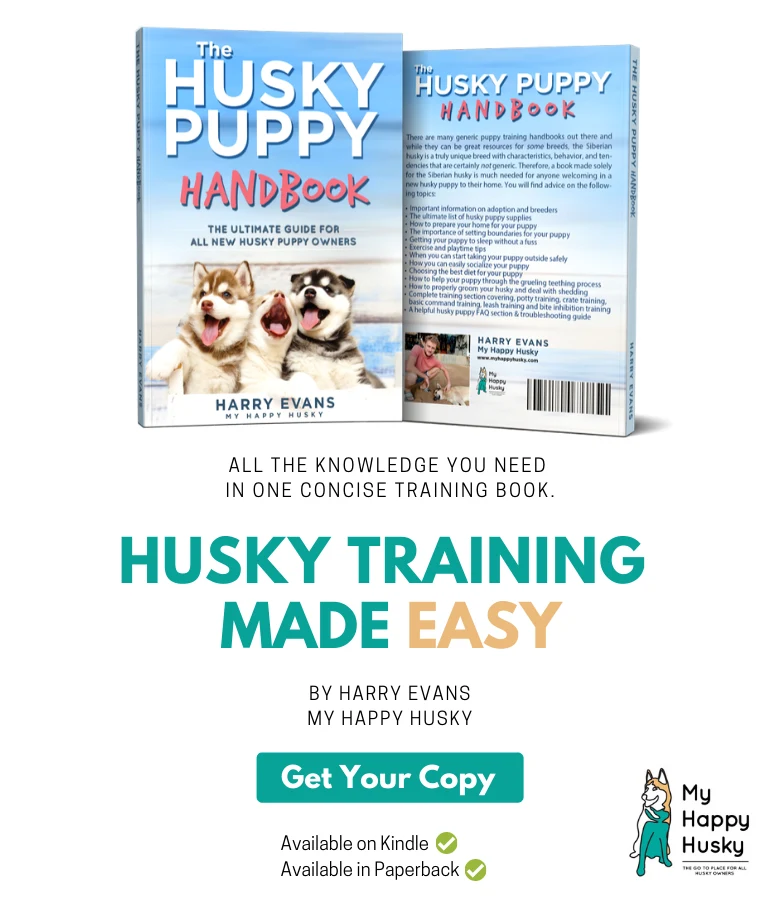We all know that our husky pups need water to stay healthy, and well, alive! So, if your puppy isn’t drinking much or not at all, it can get you pretty worried.
This article’s got all the info you need, so you’ll know exactly what to do.
Below I’ll cover the 5 main reasons why puppies refuse water, how much they should be drinking and how you can help them drink more.
5 Reasons Your Husky Pup Won’t Drink Water
Before you can start helping your puppy to drink more water, you must first find out why he isn’t drinking enough, to begin with.
Let’s explain each one in more detail.
1) Not Receiving Enough Physical Activity
If your puppy is not receiving enough exercise, it can affect his health in many negative ways. When there is a lack of physical exertion, it’s natural for your puppy to drink less.
To put it simply, when your puppy exercises, his body temperature rises and he sweats through his paws in order to cool down. To replace the water lost through sweating, your puppy will feel thirsty and will have the urge to drink water.
This is a rather basic explanation of how feeling thirsty works, and it’s the same for us too.
Take a look at your puppy’s exercise routine and think about whether it’s enough.
2) Dehydration
Weird one right? Let me explain. It’s normal to think that when your puppy is dehydrated, he will naturally want to drink more water…
Well, it’s not that simple! Sometimes it can be that the more dehydrated your puppy gets, the less inclined he’ll be to drink water. This happens due to many negative biological responses his body goes through while being dehydrated.
Is your puppy dehydrated? The telltale signs are excessive drooling, dry or sticky gums, vomiting or diarrhea, dry skin or problems with his coordination.
3) Health Issues
There can be many health issues that cause your puppy to stay away from his water bowl.
Health problems like urinary tract infections (UTI), diabetes or kidney disease can all be big contributing factors. Health issues like these can even completely diminish your puppy’s desire to drink water.
If you suspect your puppy isn’t drinking water because of a health problem, you should contact your veterinarian immediately to take further tests.
4) Different Surroundings
If you have recently moved homes, you may find your puppy’s eating and drinking habits change. When a puppy enters a new environment he’s not familiar with, it can disrupt his natural body clock for pretty much everything.
New sounds and smells can be quite off-putting for your puppy. The water could even taste different and your puppy isn’t quite used to it yet.
If you’ve recently moved or you’ve taken your puppy on vacation. This could easily be the reason why.
5) Aging
Of course, this one isn’t puppy-related!
Old age contributes to many different health problems for dogs, a lack of appetite for food and drink is one of them. Aged dogs may find it too difficult to physically get up and walk to the water bowl.
If your dog is reaching his senior years, you have to do more to make his daily routine easier. Move his food and water bowl right next to his bed.
How Much Water Does My Puppy Need?
So, how much water does your puppy actually need? Before you get too concerned about your puppy’s drinking habits, it’s important to know how much is water is actually enough.
A weaning puppy typically needs a 1/2 cup of water every couple of hours. This will depend on his age and weight.
As your puppy gets older, over three months of age, the water requirements will decrease to around 1/2 ounce to 1 full ounce per pound of bodyweight. If your puppy weighs 30lbs, in one day he should drink 15-30 ounces of water.
This is just a guideline and many factors can change it depending on where you live, the temperature, how much exercise he receives. But it’s a good guideline to start with.
Now you know how much water your puppy should be drinking, we can take a look at what you can do to encourage more gulps at the water bowl!
How to Get Your Puppy to Drink Water Quickly
If your puppy needs more water, here are some ways you can encourage him to drink more.
Some ways will work better with different puppies, try them all and see which works the best for you.
1) Add water to his dry food
Since puppies eat 3-4 times per day, this is a great moment to sneak in some water! When next mealtime comes around, add a glass of clean, room-temperature water to his bowl and give it a stir to make a soupy texture. It’s best to do this before he enters the room.
Usually, dogs and puppies prefer cool water to drink, but in this case, it’s better to use room temperature just so it blends in with his food better and doesn’t put your puppy off eating! That’s definitely not what we want.
2) Exercise your puppy more (just a little)
When it comes to exercising a puppy, age is very important and you should never overdo it. Too much, too early, could negatively affect his bones, joints, and ligaments.
Throw the frisbee or his ball a little bit more than you usually do, get him panting for a while before you stop and guide him to his water bowl. This usually works a charm and most panting puppies will happily take a drink of water.
An extra 15-20 minutes per day will be ok, it’s important not to overdo it while he’s still young.
3) Change the location of the water bowl
Something as simple as changing the water bowl location could encourage your puppy to start drinking more. Puppies are sensitive while they’re young and many things can scare or frighten them.
There could be some bad smells that your puppy is picking up in the current area where his water bowl is. A foul smell could be enough to stop your puppy from going there to drink. Try changing his water bowl to another location, and make sure it’s somewhere quiet, clean, and safe.
4) Constantly replace the water
This one sounds obvious, but we are all guilty of this one at least a few times. Keeping his water clean and dirt-free is really important, and it’s surprising how some puppies react to this. It’s natural for us to assume they don’t care, but this could definitely be the reason why he isn’t drinking enough.
Keep the water clean and cold.
5) Put an ice cube or treat in his water bowl
Icecubes work better if you are in a hot country, but you can do it anywhere. Not only does this cool his water, but it also makes drinking a game!
Treats work very well, but if you don’t have any to spare, icecubes also work. Your pup will be rather amused by a floating treat or IceCube and through his attempts of getting it, he’ll be consuming water at the same time.

Signs of Dehydration in Puppies
Dehydration is a serious matter and needs to be sorted out as soon as possible. It helps to know the common signs of dehydration so you can take the appropriate action and visit your veterinarian as soon as possible.
Let’s take a look at the classic signs of dehydration seen in puppies:
- Dry mouth and gums
- Excessive drooling
- Bad skin elasticity
- Continuous panting
- Lethargy or a lack of energy
- Lack of appetite
- Dry nose
- Weakness
- Vomiting
- Diarrhea
- Collapsing
If your puppy shows any of these signs, you must take him to a Vet as soon as possible for further checks.
How Long Can Puppies Go Without Water?
Although it’s hard to give an exact measure of time, many veterinarian professionals say that dogs can survive around 3 days without consuming any water.
For puppies, it will be less. But please remember this is the worst-case scenario…
After 24 hours of not drinking, dehydration will already have set in and the first signs you may notice will be panting, vomiting, dry nose, or drooling excessively. Water intake becomes critical at this stage and a trip to the vets is absolutely necessary!
Summary
Hopefully, this article has helped you identify why your puppy isn’t drinking water, and what you can do about it.
Whenever it comes to health issues, time is always key. Visit your vet if you are unsure.
Most Recommended For Huskies 🐶
Best Brushes For Husky Shedding ⭐
My two favorite brushes for a beautiful coat are a simple Undercoat Rake and a Slicker Brush. These brushes when used together will de-shed and maintain your husky’s coat better than anything else.
Best Online Training Program For Huskies⭐
Brain Training For Dogs has become increasingly popular with Siberian Huskies in the last few years. It’s now recognized as perhaps the best way to train a husky in the most stress-free, positive way.
Best Husky Puppy Book ⭐
If you would like to support My Happy Husky directly and have an easy to read and entertaining guide for training your husky puppy, check out my book The Husky Puppy Handbook on Amazon. All purchases are greatly appreciated.

Helpful Resources:
https://dogcare.dailypuppy.com/much-water-should-new-puppy-drink-2986.html
https://www.puppypointers.com/how-long-can-a-puppy-go-without-water/
Dr. Karen Becker – https://healthypets.mercola.com/sites/healthypets/archive/2017/08/06/dehydrated-pet.aspx
PetMD https://pets.webmd.com/dogs/water-dog-health
Disclaimer
The advice given in this article is for educational purposes only and does not constitute professional advice in any context. Before making any decisions that may affect the health and/or safety of your dog, you should always consult a trained veterinarian in your local area. For the FULL disclaimer Visit HereCopyright Notice: The content produced and published on My Happy Husky is unique and original. My Happy Husky makes an active effort to search for plagiarized content using plagiarism detection software. If plagiarized content is found, action will be taken.
